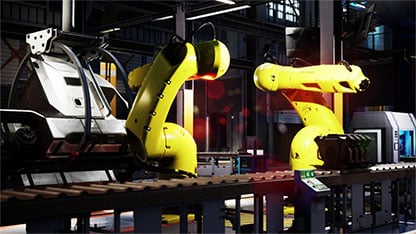Minimize risk and meet regulatory requirements for AI-Enabled Industrial Machinery
The integration of Artificial Intelligence (AI) and Machine Learning (ML) in industrial machinery is revolutionizing the manufacturing and industrial sectors. This transformative technology is reshaping how industrial equipment operates, offering enhanced predictive maintenance capabilities, optimized production processes, and improved operational efficiency. Rapid advancement of AI-enabled and Machine Learning industrial machinery is driven by technological innovations, market demands, and competitive pressures worldwide.
AI has already been introduced across a variety of products and applications in the industrial machinery sector, such as:
- Predictive maintenance systems
- Autonomous manufacturing robots
- Quality control and inspection systems
- Production line optimization
- Supply chain management
- Smart sensors and IoT integration
- Energy management systems
- Safety monitoring and hazard detection
- Equipment performance analytics
- Process automation and control
- Inventory management systems
- Cybersecurity for industrial systems
- And much more
Regulatory bodies and industry standards organizations are developing comprehensive frameworks to address the unique safety challenges posed by AI and ML in industrial machinery. The new EU Machinery Regulation specifically addresses critical AI safety concerns, requiring manufacturers to implement safety circuits that limit self-learning systems within defined risk parameters during their learning phases. This regulation introduces essential health and safety requirements for mobile autonomous machines, including driverless systems commonly used in warehouses and industrial facilities.
The EU Machinery Regulation also mandates robust cybersecurity measures, requiring safety circuits that prevent hazardous machine behavior resulting from malicious network attacks and corruption of computer systems. For collaborative robots (cobots) working alongside humans, new safety solutions address both physical risks from moving parts and psychological stress factors in collaborative environments. Organizations such as OSHA in the United States and industrial safety boards in Canada are similarly developing proactive guidelines to ensure comprehensive worker protection, equipment reliability, and operational standards in AI-enhanced industrial environments.
We specialize in ensuring the safe and reliable deployment of artificial intelligence and machine learning technologies in industrial manufacturing environments and support you to meet all obligations from the new Machinery Regulation 2023/1230 as well as the EU AI Act Regulation 2024/1689.
Our dedicated team provides comprehensive quality assurance services, from initial algorithm assessment through operational validation, helping manufacturers confidently implement AI-driven solutions in their production systems. Our holistic approach integrates AI-specific quality management with traditional machinery safety criteria, covering all critical aspects of intelligent industrial systems:
Risk & Quality Management - Systematic hazard analysis and risk assessment protocols that combine AI-specific failure modes with conventional machinery safety requirements
Data Governance - Validation of training and testing datasets, data quality assurance, and ongoing data integrity monitoring to ensure consistent AI performance throughout operational lifecycles
Reliability & Robustness Testing - Comprehensive stress testing considering realistic industrial conditions, such as temperature variations, electromagnetic interference, and high-demand operational cycles
Explainability & Transparency - Implementation of interpretable AI frameworks and decision traceability systems that meet industrial audit and compliance requirements
Cybersecurity - Comprehensive security measures of AI systems including vulnerability testing, secure model deployment, and protection against adversarial attacks in connected industrial environments
Technical Documentation - Complete documentation packages that satisfy both AI validation standards and traditional machinery certification requirements
Our methodology integrates these AI quality dimensions with established industrial safety standards including IEC 61508, ISO 13849, IEC 62061, ISO/IEC 27001, ensuring your intelligent machinery meets both innovation goals and rigorous safety mandates of the new regulations.
From predictive maintenance systems to autonomous robots and intelligent process optimization, we validate every aspect of AI implementation to guarantee reliable performance in demanding manufacturing environments.
Partner with us to deploy AI-enhanced machinery with complete confidence in its safety, reliability, and regulatory compliance.
